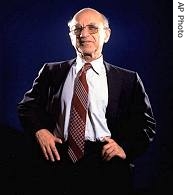-
(单词翻译:双击或拖选)
By Paul Francuch
Chicago
16 November 2006
Professor Milton Friedman, hailed by some as perhaps the 20th century's greatest champion of capitalism1 and economic freedom, is dead at the age of 94.
 Dr. Milton Friedman, 1976 Nobel Prize winner for economics, poses for a photo in 1977 |
||
Born in New York to poor Jewish parents, Friedman displayed brilliance7 in mathematics at a young age, winning a scholarship to Rutgers University in neighboring New Jersey8. Intrigued9 by the field of economics, Friedman went on to do graduate work at the University of Chicago, the home of some of the nation's leading conservative economists10 of the time.
While at Chicago, he married fellow graduate student Rose Director. Following World War II, Friedman earned his doctorate11 at Columbia University, then returned to Chicago as a faculty12 member.
While championing the cause of the free marketplace, Friedman faced much opposition13 from his fellow economists who believed in the teachings of liberal British economist John Maynard Keynes. The United States government under President Franklin Roosevelt spent its way out of the great depression of the 1930s, following the theories of Keynes. Needless to say, Keynes's theories enjoyed remarkable14 popularity.
Yet Professor Friedman and his followers15 at the Chicago school attacked Keynes' sanctioning of government intrusion in the free market. Friedman argued that inflation caused by the government's printing of more money distorts the economy, eventually leading to its collapse16, thereby17 creating an even bigger role for the state in the private lives of its citizens.
He said individualism and freedom of enterprise were the preferable alternatives.
"A free market and maintaining a free market, under conditions where the market is not distorted, is by all odds18 the most useful role a government can play in economic life," said Friedman. "But this requires that government be relatively19 small. When government imposes taxes, when it buys things, spends money, it distorts the terms on which people can trade with one another."
"The most obvious example is in foreign trade," he added, "our government, most of the governments around the world impose restrictions20 on foreign trade. They impose tariffs21, or quotas22, or subsidize exports."
"All such restrictions, all such impositions, interfere23 with the effective operation of the market, prevent people who could benefit jointly24 from trading with one another from doing so. So I go back: the most useful role government can play is to stay out of the details of the market, but establish an effective framework for a free market," he said.
Friedman argued that a free market encompasses25 much more than just economic concerns.
"A free market includes the free exchange of views, the ability to read what people write, regardless of what their views are, the whole area of freedom of speech, of religion, of discussion, of the press, is really an aspect of a free market," he said. "It is an area in which individuals should be free to cooperate with one another, to exchange views, to say what they believe."
Friedman began teaching his laissez faire economic theories at a time when many in his profession scorned such ideas. That is not the case today.
Milton Friedman's students include some of the best and the brightest. He served as an economic advisor26 to several presidents, and his ideas are bound to influence economists and economic policy for many years to come.
 收听单词发音
收听单词发音
1
capitalism

|
|
| n.资本主义 | |
参考例句: |
|
|
|
2
economist

|
|
| n.经济学家,经济专家,节俭的人 | |
参考例句: |
|
|
|
3
eloquent

|
|
| adj.雄辩的,口才流利的;明白显示出的 | |
参考例句: |
|
|
|
4
proponent

|
|
| n.建议者;支持者;adj.建议的 | |
参考例句: |
|
|
|
5
persistent

|
|
| adj.坚持不懈的,执意的;持续的 | |
参考例句: |
|
|
|
6
intervention

|
|
| n.介入,干涉,干预 | |
参考例句: |
|
|
|
7
brilliance

|
|
| n.光辉,辉煌,壮丽,(卓越的)才华,才智 | |
参考例句: |
|
|
|
8
jersey

|
|
| n.运动衫 | |
参考例句: |
|
|
|
9
intrigued

|
|
| adj.好奇的,被迷住了的v.搞阴谋诡计(intrigue的过去式);激起…的兴趣或好奇心;“intrigue”的过去式和过去分词 | |
参考例句: |
|
|
|
10
economists

|
|
| n.经济学家,经济专家( economist的名词复数 ) | |
参考例句: |
|
|
|
11
doctorate

|
|
| n.(大学授予的)博士学位 | |
参考例句: |
|
|
|
12
faculty

|
|
| n.才能;学院,系;(学院或系的)全体教学人员 | |
参考例句: |
|
|
|
13
opposition

|
|
| n.反对,敌对 | |
参考例句: |
|
|
|
14
remarkable

|
|
| adj.显著的,异常的,非凡的,值得注意的 | |
参考例句: |
|
|
|
15
followers

|
|
| 追随者( follower的名词复数 ); 用户; 契据的附面; 从动件 | |
参考例句: |
|
|
|
16
collapse

|
|
| vi.累倒;昏倒;倒塌;塌陷 | |
参考例句: |
|
|
|
17
thereby

|
|
| adv.因此,从而 | |
参考例句: |
|
|
|
18
odds

|
|
| n.让步,机率,可能性,比率;胜败优劣之别 | |
参考例句: |
|
|
|
19
relatively

|
|
| adv.比较...地,相对地 | |
参考例句: |
|
|
|
20
restrictions

|
|
| 约束( restriction的名词复数 ); 管制; 制约因素; 带限制性的条件(或规则) | |
参考例句: |
|
|
|
21
tariffs

|
|
| 关税制度; 关税( tariff的名词复数 ); 关税表; (旅馆或饭店等的)收费表; 量刑标准 | |
参考例句: |
|
|
|
22
quotas

|
|
| (正式限定的)定量( quota的名词复数 ); 定额; 指标; 摊派 | |
参考例句: |
|
|
|
23
interfere

|
|
| v.(in)干涉,干预;(with)妨碍,打扰 | |
参考例句: |
|
|
|
24
jointly

|
|
| ad.联合地,共同地 | |
参考例句: |
|
|
|
25
encompasses

|
|
| v.围绕( encompass的第三人称单数 );包围;包含;包括 | |
参考例句: |
|
|
|
26
advisor

|
|
| n.顾问,指导老师,劝告者 | |
参考例句: |
|
|
|















